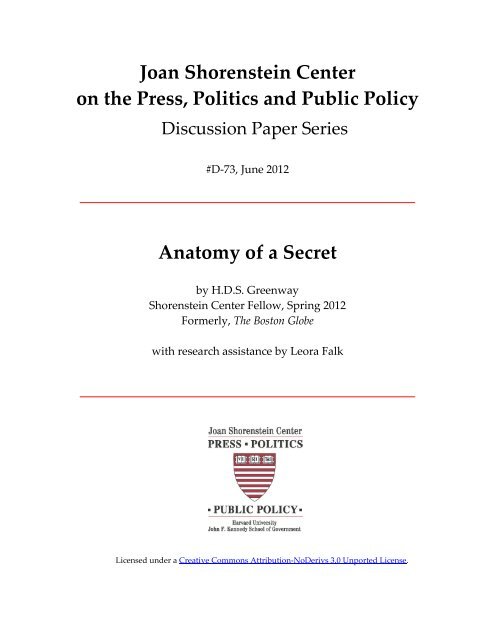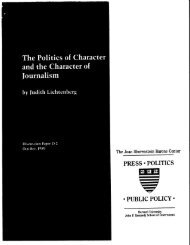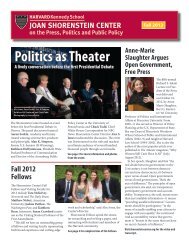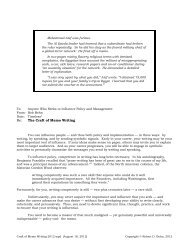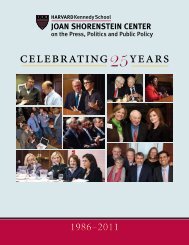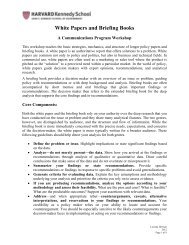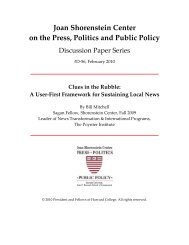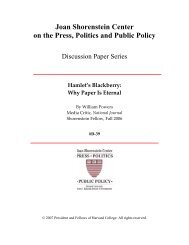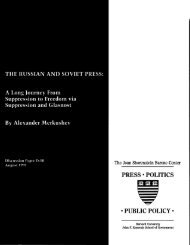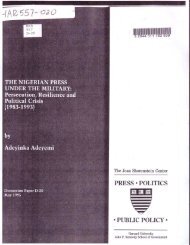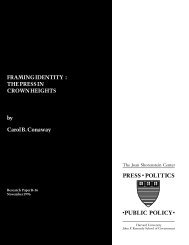Anatomy of a Secret - Harvard Kennedy School
Anatomy of a Secret - Harvard Kennedy School
Anatomy of a Secret - Harvard Kennedy School
Create successful ePaper yourself
Turn your PDF publications into a flip-book with our unique Google optimized e-Paper software.
Joan Shorenstein Center<br />
on the Press, Politics and Public Policy<br />
Discussion Paper Series<br />
#D-73, June 2012<br />
<strong>Anatomy</strong> <strong>of</strong> a <strong>Secret</strong><br />
by H.D.S. Greenway<br />
Shorenstein Center Fellow, Spring 2012<br />
Formerly, The Boston Globe<br />
with research assistance by Leora Falk<br />
Licensed under a Creative Commons Attribution-NoDerivs 3.0 Unported License.
“The first criterion is that you make the decision, not they.”<br />
–Benjamin Bradlee<br />
“Not every secret yearns to be published.”<br />
–Arthur Sulzberger Jr.<br />
There can be no more agonizing decision that newsmen and women are asked to<br />
make than whether to publish or broadcast a story that entails a risk to national security.<br />
After all, the entire purpose <strong>of</strong> newsgathering is to get at the truth, and a healthy<br />
skepticism <strong>of</strong> any effort to withhold the truth is essential to a free press. And in<br />
journalism, a highly competitive business, there is always the danger that if you don’t<br />
publish, somebody else will.<br />
There is also a constitutional bias in favor <strong>of</strong> publication in this country. The First<br />
Amendment to the Constitution says: “Congress shall make no law…abridging the<br />
freedom <strong>of</strong> the press….”<br />
Yet none will deny that government has a right and a duty to protect information<br />
that could harm the security <strong>of</strong> the United States, and responsible news outlets do not<br />
wish to harm their country. So the question is ever: Would printing this story really<br />
harm the country? Or, is the request to hold the story a cover-up or an attempt to avoid<br />
embarrassment?<br />
What follows is the story <strong>of</strong> a secret which the U.S. government dearly wanted to<br />
keep. It is the story <strong>of</strong> how that secret came to be known by The New York Times, and <strong>of</strong><br />
how the Times at first agreed to keep that secret at the government’s request, and then,<br />
after agonizing about it for more than a year, decided to run it.<br />
The case is unusual in that the pressure not to publish went right up to the highest<br />
level <strong>of</strong> government. In a unprecedented step, the President <strong>of</strong> the United States<br />
summoned the publisher and the editor <strong>of</strong> The New York Times to the Oval Office to<br />
make a final pitch not to publish.<br />
2
In all the months that the Times held the story competing papers never got wind <strong>of</strong> it.<br />
And that, too, is unusual.<br />
If the tension between government and the press over secrets is the storyline, a<br />
subtext is the natural tension between impatient reporters who wanted their story to be<br />
published right away, and their editors who felt a responsibility to further consider the<br />
government’s case for not publishing.<br />
STELLAR WIND<br />
Never in the history <strong>of</strong> the United States, nor anywhere else for that matter, had<br />
there been such a massive terrorist attack as the one on September 11, 2001. And the<br />
shadowy nature <strong>of</strong> the non-state actor as enemy, instead <strong>of</strong> the traditional nation state,<br />
was alarming. It was a whole new concept <strong>of</strong> war, and, although this nation would<br />
invade both Iraq and Afghanistan in response, it was quickly realized that this would be<br />
an intelligence war, and that military solutions would be inadequate.<br />
Terrorism could not be defeated. It was a means for Islamic extremists to vent their<br />
frustrations upon the West. Preventing further attacks depended on knowing the when,<br />
where and how <strong>of</strong> terrorist plans. The old methods, means and scope <strong>of</strong> traditional<br />
intelligence gathering would no longer do, or so it was thought by the badly shaken<br />
administration <strong>of</strong> a new president, George W. Bush.<br />
When the Bush administration came into <strong>of</strong>fice, it was generally considered that<br />
domestic spying was <strong>of</strong>f limits for the CIA and the National Security Agency (NSA), the<br />
ultra-secret agency tasked with electronic eavesdropping. Both had been in trouble<br />
before for keeping tabs on American citizens, but the rules had been tightened.<br />
In the wake <strong>of</strong> 9/11, however, how could we be sure that our own citizens had not<br />
been drawn into the jihadist cause? Wouldn’t the new, unprecedented threat justify<br />
eavesdropping on Americans? “Basically all the rules were thrown out the window,”<br />
according to Adrienne Kinne, a former NSA employee, “and they would use any excuse<br />
to justify a waiver to spy on Americans.” 1<br />
3
Thus was Stellar Wind born, an operation which resulted in an unprecedented<br />
encounter in the Oval Office between President George W. Bush and New York Times<br />
publisher Arthur Sulzberger Jr. over whether a news story should ever see the light <strong>of</strong><br />
day.<br />
According to William Binney, a former NSA cryptologist, Stellar Wind information<br />
was gathered through a network <strong>of</strong> windowless wiretapping rooms around the country,<br />
known as “switches,” which could gain access to international and domestic<br />
communications. AT&T and Verizon were drawn into an eavesdropping network <strong>of</strong><br />
vast scale. 2<br />
The Federal Intelligence Surveillance Act (FISA) had established courts to quickly<br />
provide warrants to intelligence agencies in the 70’s. But Stellar Wind bypassed that<br />
process. This was to be a warrantless wiretap, for reasons that have never adequately<br />
been explained. Perhaps, despite how easy warrants were to obtain, NSA decided that<br />
the process would be too restricting and complicated. Perhaps NSA just couldn’t be<br />
bothered. The disgruntled Binney would tell author James Bamford that “they violated<br />
the Constitution” setting up Stellar Wind “but they didn’t care. They were going to do it<br />
anyway, and they were going to crucify anyone who stood in the way.” Bamford alleged<br />
that the “NSA illegally...allowed wholesale monitoring <strong>of</strong> millions <strong>of</strong> American phone<br />
calls and emails.” 3<br />
In the wake <strong>of</strong> the program’s exposure, Congress passed the FISA Amendment Act<br />
in 2008 which largely made the practices legal. But that does not address whether Stellar<br />
Wind was illegal when it was first set up after 9/11. To some, the 2008 FISA Act was akin<br />
to declaring a burglary legal after the burglars had been caught.<br />
Was Stellar Wind illegal? The New York Times came to think so. But General Michael<br />
Hayden, who was head <strong>of</strong> NSA at the time, holds a different opinion. I asked him if he<br />
had any doubts. “I still say no,” he said. “The wiretaps were perfectly lawful and<br />
provided useful intelligence.” 4<br />
In defense <strong>of</strong> the wiretaps Hayden wrote, “the program was crucial in addressing<br />
one <strong>of</strong> the most stinging criticisms <strong>of</strong> the 9/11 Commission—the need to reduce the gap<br />
4
etween foreign intelligence and domestic security. This was an especially difficult task,<br />
which helps explain both the program’s importance and its sensitivity. The program was<br />
lawful, effective and necessary….Here I must point out that agency lawyers, career<br />
attorneys with deep expertise in the law, privacy and intelligence, assisted their<br />
pr<strong>of</strong>essional Justice Department counterparts in their review <strong>of</strong> the program but<br />
remained comfortable throughout with the lawfulness <strong>of</strong> all aspects <strong>of</strong> the surveillance<br />
effort....The elements <strong>of</strong> the program made public in news reports in December <strong>of</strong> 2005<br />
had been consistently deemed lawful by the Justice Department.” 5<br />
The “news reports” to which Hayden was referring ran on page one <strong>of</strong> The New York<br />
Times under the headline: “BUSH LETS U.S. SPY ON CALLERS WITHOUT COURTS,”<br />
by James Risen and Eric Lichtblau. It told <strong>of</strong> “eavesdropping inside the country without<br />
court approval” that was “a major shift in American intelligence gathering practices.”<br />
The story equivocated on the legal implications by questioning, rather than stating,<br />
whether the NSA “stretched, if not crossed, constitutional limits on legal search.” 6<br />
But if NSA was acting in an unusual manner, so was the Times. The story revealed<br />
that the article had been held for a year. “The White House had asked The New York<br />
Times not to publish this article,” Risen and Lichtblau wrote, arguing that to do so could<br />
jeopardize continuing investigations and alert would-be terrorists that they might be<br />
under scrutiny. The story had been delayed for additional reporting, Risen and<br />
Lichtblau wrote, and “some <strong>of</strong> the information that administration <strong>of</strong>ficials argued could<br />
be useful to terrorists has been omitted.” 7<br />
a bit more than a year, and that later led to controversy.<br />
In actuality, however, the story had been held<br />
Hayden’s allegations, and later the White House’s contention, that everybody was<br />
on board with the legal implications <strong>of</strong> Stellar Wind do not appear to have been true in<br />
all cases. Justice Department reporter Lichtblau would later write: “The source had come<br />
to me blindly at the outset—what the CIA would call a ‘walk -in.’ Walk-ins pose a risk,<br />
be they government whistle-blowers or Russian double agents. Some may have an<br />
agenda, an ax to grind. Others may lack credibility. Some may not even be who they<br />
claim to be. This one had checked out on all counts. He wouldn’t give me his real name<br />
5
at first, and initially, I would have to make contact through an intermediary to arrange<br />
meetings, usually at a bookstore or a c<strong>of</strong>fee shop in the shadows <strong>of</strong> Washington’s power<br />
corridors….He was agitated about something going on in the government’s intelligence<br />
community, but just what was not clear. Was it even worth my time?” 8<br />
Lichtblau recognized that “this was one <strong>of</strong> the lesser known by-products <strong>of</strong> the All<br />
the President’s Men phenomenon. Just as Bob Woodward and Carl Bernstein had inspired<br />
a generation <strong>of</strong> young journalists like myself to become government watchdog sleuths,<br />
they had also given rise to armies <strong>of</strong> self-styled Deep Throats,” he wrote. 9<br />
According to Lichtblau, his sources enabled him to go to other sources and, in<br />
collaboration with Jim Risen, piece together, bit-by-bit, like a jigsaw puzzle, the story <strong>of</strong><br />
Stellar Wind. 10<br />
“It soon became clear that the nervousness that the source alluded to was roiling the<br />
executive branch,” Lichtblau wrote. It became apparent that there were real worries<br />
within the administration about Stellar Wind’s legality. An election was coming, and if<br />
John Kerry won who could tell what investigations there might be? 11<br />
Lichtblau and Risen, whom Lichtblau described as the odd couple—“Felix Unger<br />
and Oscar Madison in reporters’ garb”—came to the story from different angles.<br />
Lichtblau had been looking at the FBI as the source <strong>of</strong> what was going on, but Risen<br />
suspected that NSA was involved. When Risen called Hayden at NSA the<br />
administration became alarmed that their big cat was out <strong>of</strong> the bag. 12<br />
In November <strong>of</strong> 2004, the administration made the highly unusual step <strong>of</strong> allowing<br />
the Times’ Washington Bureau Chief, Philip Taubman, to visit NSA headquarters at Fort<br />
Meade, Maryland. He met General Hayden, his general counsel, “and several top NSA<br />
aides who managed the surveillance program,” Taubman said. Hayden “argued that the<br />
surveillance program was critically important to preventing another terror attack like<br />
9/11.” He and his team cited several examples <strong>of</strong> plots that had been foiled,“ and they<br />
described a series <strong>of</strong> internal safeguards to ensure the program was carefully and legally<br />
managed.” 13<br />
6
“I was against publishing it, at least initially,” Taubman told me. “The<br />
administration had persuaded Bill [Keller] and me at the time that we literally might be<br />
putting American lives in danger.” Keller was, at the time, executive editor <strong>of</strong> the Times.<br />
“Also,” Taubman said, “the story wasn’t ready for primetime. Jim and Eric had done a<br />
terrific job <strong>of</strong> reporting, but there were gaps. Put yourself in the mindset <strong>of</strong> where we<br />
were. There was a growing sense that the Bush administration might be contravening<br />
the law, but we were persuaded after meeting with Condoleezza Rice and Hayden that<br />
it was critical to preventing terrorism.” It was left open that the Times might eventually<br />
publish the story. 14<br />
The administration’s team “described a series <strong>of</strong> internal safeguards to ensure the<br />
program was carefully and legally managed,” Taubman told me. He had his doubts<br />
about the case they were selling, but “I thought the case sufficiently strong to hold <strong>of</strong>f on<br />
publication,” he said. “I thought the potential damage to national security outweighed<br />
questionable aspects <strong>of</strong> the program…. I kept saying, ‘General Hayden, wouldn’t it<br />
make sense to bring in an outside panel <strong>of</strong> former intelligence people and judicial?’ If<br />
they had just gone to Congress, instead <strong>of</strong> just the gang <strong>of</strong> eight intelligence committee<br />
members, to the majority and minority leaders, [NSA] would have gotten approval.” Bill<br />
Keller agreed with Taubman about holding the story for further reporting. 15<br />
An example <strong>of</strong> the kind <strong>of</strong> thing NSA eavesdropping had prevented was a plot by a<br />
man named Iyman Faris, a naturalized American in Ohio, who had planned to drive to<br />
New York and bring down the Brooklyn Bridge with blowtorches. 16<br />
that the Times would later decide lacked seriousness.<br />
Jim Risen never had any question that his story about warrantless wiretapping was<br />
true, Bill Keller said in an interview, “and in the course <strong>of</strong> trying to persuade us not to<br />
run the story they confirmed every bit <strong>of</strong> it.”<br />
17<br />
7<br />
It was an example<br />
According to Keller, there were two considerations in deciding whether to publish or<br />
not. “One, were they [NSA] breaking the law, and, two, will this give comfort to al<br />
Qaeda?” If al Qaeda were to know that their communications with the United States,
presuming there were any, were being overheard al Qaeda would cease communicating,<br />
or change how they went about it.<br />
The administration “tried to convince us that this was really important,” Keller said,<br />
but Risen and Lichtblau were pushing hard to go to print. “Initially the government was<br />
convincing,” Keller said, “but we hadn’t heard enough yet to say whether it was<br />
illegal.” 18<br />
Another argument against publishing, Keller said, was that in 2004 “key sources<br />
were pushing us to publish before the general election, threatening to take the story to<br />
another paper. They wanted to hurt Bush,” Keller said, “and that set <strong>of</strong>f alarm bells with<br />
me. Wait a second! This guy has a political agenda! ” 19<br />
Risen, Lichtblau and Rebecca Corbett, the Washington bureau’s investigative<br />
reporting editor, did not agree with the decision to hold the story. They thought the<br />
story should go to print right then without further delay. Taubman understood their<br />
frustration. He had been in the position <strong>of</strong> eager reporter versus a cautious editor. Risen<br />
and Lichtblau were very discouraged, Taubman recalled. He wouldn’t have blamed<br />
them if they thought their editors cowardly. 20<br />
“Cowardly? I wouldn’t put it that way,” said Risen, “but Eric and I were pushing to<br />
have it published.” Was the story improved by more reporting? “We did get more<br />
stuff,” said Risen, “but I still think we should have published in 2004. But that said, I<br />
give them [the editors] credit. It was a great public service that we published it when we<br />
did. Other papers might not have published it at all. You have to give The New York<br />
Times credit.” Risen said that there was worry in the White House that some <strong>of</strong> them<br />
might be prosecuted if the story got out. It was a cover-your-ass proposition as much as<br />
it was a national security issue, in Risen’s opinion. 21<br />
“I didn’t think it [holding the story] was the right decision either,” Lichtblau told me.<br />
He thought that Keller and Taubman had been “pretty actively misled by the<br />
administration,” and that this was the basis for holding the story. “In my opinion, all the<br />
important elements <strong>of</strong> the story were there in 2004,” he said.<br />
8<br />
22
In his book, however, Lichtblau wrote that “on sensitive stories the reporters are the<br />
ones invariably pushing to publish, but unlike bloggers and other instant journalists in<br />
the new Internet Age, we as reporters don’t have the ability to simply publish something<br />
<strong>of</strong> our own accord. Which is the way it should be. The ‘mainstream media,’ as the<br />
bloggers like to call us, have a built-in backstop, a check and balance, and it’s called the<br />
editor. Editors are the ones who ultimately decide what goes in the paper and what<br />
prominence it should be given.” 23<br />
And so the story was held, and went into a state <strong>of</strong> suspended animation. It hadn’t<br />
been spiked, but it wasn’t being worked on either. Joseph Lelyveld, Keller’s predecessor<br />
and mentor, sympathized with the decision to hold, but questioned the length <strong>of</strong> the<br />
hold. “You have to have a lot <strong>of</strong> confidence to bring out a story like that just before an<br />
election,” Lelyveld later recalled. “But if the story wasn’t ready to go in 2004, why didn’t<br />
it appear in early 2005? Why not push forward until everybody was satisfied? Did they<br />
take their eye <strong>of</strong>f the ball?” 24<br />
Sort <strong>of</strong>. “Jim went <strong>of</strong>f on book leave pretty soon after the new year,” said Rebecca<br />
Corbett, “and Eric was <strong>of</strong>f doing other things. And there was a certain angst about the<br />
decision to hold the story.” What Corbett regrets is that the story that was held was in<br />
draft form, not a finished, polished product that could be discussed in light <strong>of</strong><br />
completion. 25<br />
Taubman wonders to this day whether Risen’s book leave wasn’t spurred by<br />
frustration over having the story held. 26 But that frustration was soon to be eased. One<br />
evening Risen asked Lichtblau to stop by his house and have a look at a chapter <strong>of</strong> the<br />
book he was working on. What Lichtblau saw, with raised eyebrows, was: “The Bush<br />
administration has swept aside nearly thirty years <strong>of</strong> rules and regulations and has<br />
secretly brought the NSA back into the business <strong>of</strong> domestic espionage. The NSA is now<br />
eavesdropping on as many as five hundred people in the United States at any given time<br />
and it potentially has access to the phone calls and emails <strong>of</strong> millions more. It does this<br />
without court approved search warrants and with little independent oversight….Several<br />
government <strong>of</strong>ficials who know about the NSA operation have come forward to talk<br />
9
about it because they are deeply troubled by it, and believe that by keeping silent they<br />
would become complicit in it. They strongly believe that the president’s secret order is in<br />
violation <strong>of</strong> the Fourth Amendment <strong>of</strong> the Constitution....” 27 Now Lichtblau and Risen<br />
were ready for new negotiations with their editors.<br />
Keller told me that over time he began to see the story in a new light, especially<br />
when good sources began to question the White House assertion that the domestic<br />
eavesdropping was legal. “I had been seeing it as an intelligence-methods story,” Keller<br />
said, a type <strong>of</strong> story the Times would have less trouble keeping secret. “But al Qaeda<br />
must know we are doing everything to impede them. Al Qaeda would assume they<br />
were being eavesdropped.” Also, it was very easy to get a warrant, but the NSA didn’t<br />
want the inconvenience. “NSA just wanted the bad guys.” Going to court, the NSA must<br />
have felt, would have been “time wasting nonsense,” Keller said.<br />
In a “Talk to the Newsroom” feature that the Times ran on its website in March, 2006,<br />
Keller made the case that the government had made a “concerted, top-level appeal” to<br />
hold the story. “They laid out a detailed argument that publishing what we then knew<br />
would compromise ongoing anti-terrorist operations, and they challenged our reporting<br />
on the issue <strong>of</strong> whether the eavesdropping program was subject to serious oversight by<br />
the courts or Congress. Their arguments were compelling enough that we felt the<br />
responsible course was to hold the story and do further reporting.” 29<br />
Select congressmen had been briefed by the government. Lichtblau recalled running<br />
into Jane Harman, ranking Democrat on the House Intelligence Committee, who was in<br />
the know. Lichtblau dropped some hints to Harman as to what he knew. “‘You should<br />
not be talking about that here,’ she scolded me in a whisper. ‘They don’t even know<br />
about that,’ she said, gesturing to her aides, who were looking on...with obvious<br />
befuddlement.”<br />
30<br />
“While Jim and Eric had some evidence <strong>of</strong> dissent within the government about the<br />
program, we had yet to learn how fierce and widespread the dissent was within the<br />
executive branch,” said Taubman. Nor did the Times know the full extent <strong>of</strong> the Bush<br />
administration’s use <strong>of</strong> “extraordinary techniques” to collect intelligence on other<br />
10<br />
28
matters. “Jim and Eric had done a brilliant job <strong>of</strong> learning about the program and its<br />
implications and shaky legal status, but I thought further reporting was warranted<br />
before we would have the story ready for publication. As I recall Keller agreed on these<br />
points,” Taubman said.<br />
Taubman said that he would still have been willing to withhold publication despite<br />
Risen’s book, although that would have made the Times look bad. But Taubman thought<br />
that the story belonged to the Times, not “just Jim Risen and his agent.” 31<br />
Now the story was back on. “Weeks <strong>of</strong> agonizing discussion preceded the decision<br />
not to run the story in 2004,” Keller said. “I expect it left the reporters disheartened, and<br />
the editors moved on to other stories. Over the ensuing months a bunch <strong>of</strong> things<br />
happened. The reporter developed additional information regarding the legality <strong>of</strong> the<br />
eavesdropping program, a painstaking process.” 32<br />
Had the threat <strong>of</strong> Jim Risen’s book scooping his own paper been a catalyst? “Jim<br />
Risen put the issue back in play by saying he wanted to write about it in his book,”<br />
Keller admitted. “Jim said he would omit the NSA material if we told him to, but this<br />
certainly helped rekindle the discussion. The Bush administration’s credibility on<br />
matters <strong>of</strong> national security was declining. Then once we decided to publish, we owed<br />
the administration ample opportunity to make their case against. I can’t really tell you<br />
an exact formula <strong>of</strong> considerations that got the decision [to hold the story] reversed, but<br />
it was a slow accumulation <strong>of</strong> factors.” 33<br />
On November 30, 2005—according to Taubman—Taubman, Keller and Lichtblau<br />
met at the White House with Stephen Hadley, who had replaced Condoleezza Rice as<br />
National Security Advisor. Rice, now <strong>Secret</strong>ary <strong>of</strong> State, was also in attendance, as was<br />
Harriet Miers, White House Counsel; James Comey, Deputy Attorney General; and John<br />
Negroponte, Director <strong>of</strong> National Intelligence. General Hayden, who had moved over to<br />
direct the CIA, led the discussion. 34<br />
According to Lichtblau, Vice President Cheney “had thought about attending....” He<br />
had been the principle advocate for Stellar Wind but the vice president decided, “with<br />
11
some justification,” that his relations with the Times might prejudice the president’s<br />
efforts to kill the story. 35<br />
“The message was clear from the long, grave faces around the room and the stern<br />
words <strong>of</strong> warning,” Lichtblau would later write. “If the story was published and the<br />
United States was attacked again, The New York Times would share the blame for the<br />
next attack.” 36<br />
When the administration saw that this top-level meeting with The New York Times<br />
wasn’t going to be enough, the White House took the unprecedented step <strong>of</strong> asking the<br />
paper’s publisher, Arthur Sulzberger Jr., to come down to Washington to be lectured to<br />
by the president himself. Never before had a request to hold a story been delivered to a<br />
publisher by a president in the Oval Office. The Times’ editors, who had at long last<br />
decided to go to press with the story, nonetheless wanted to give the White House one<br />
last chance to talk them out <strong>of</strong> it.<br />
The meeting took place on December 5, 2005, with Sulzberger, Keller and Taubman<br />
for the Times, and with President Bush, Miers and Hayden speaking for the<br />
administration. Taubman remembers it being cold, “snowing a bit.” There was concern<br />
lest they be recognized, so they were picked up by the Treasury Building and escorted<br />
past the East Wing and into the West Wing via the Rose Garden, Taubman said. “Lots <strong>of</strong><br />
drama.” 37<br />
“Bush opened the meeting with a cogent, four- to five-minute explanation <strong>of</strong> why he<br />
felt so strongly that the Times shouldn’t publish the story,” Taubman recalled. “He then<br />
asked Hayden to describe the program. He did so in considerable detail for 20 to 25<br />
minutes. There was a general discussion among us after that, with Bush and Hayden<br />
doing most <strong>of</strong> the talking for the administration. Arthur, Bill and I asked questions.”<br />
Arthur Sulzberger went into the meeting determined to be fair and to listen<br />
carefully. It would be a big decision. “Not a bet-the-company decision,” Sulzberger told<br />
me, but a decision that could affect the reputation <strong>of</strong> his newspaper. “You had to go in<br />
with an open mind.” 39<br />
12<br />
38
Sulzberger found President Bush and his team “stunningly unconvincing” when it<br />
came to the plots that their domestic eavesdropping had unearthed. The idea that<br />
someone could bring down the Brooklyn Bridge with a blowtorch was risible, and<br />
Sulzberger thought he detected a faint smile on the president’s lips when Hayden<br />
mentioned it. But when Sulzberger smiled, Hayden turned on him and snapped: “‘It’s<br />
not funny, ’” Sulzberger remembered. 40<br />
“The president was gracious, but was silent through most <strong>of</strong> it,” Sulzberger said.<br />
“He did say we could be called to defend what we had done” if publishing resulted in<br />
an attack on the United States. “But history suggests that the story did not make security<br />
worse.” 41<br />
Sulzberger said he sympathized with the White House. “Their day job is to think <strong>of</strong><br />
the worst case scenarios, and not all information yearns to be published.” There were<br />
technical and operational details that the Times was perfectly willing to leave out <strong>of</strong> the<br />
story. 42<br />
It was on the question <strong>of</strong> whether NSA had broken the law that Sulzberger would<br />
have liked to have taken “a deeper dive,” he recalled. He asked the president and his<br />
team if he could speak to three or four other people on the question <strong>of</strong> legality.<br />
Sulzberger would have liked more sourcing, “Journalism 101,” he said, “but I never<br />
heard back. They never even called back to say no.” 43<br />
Hayden, however, has no recollection <strong>of</strong> Sulzberger’s request for more information,<br />
“but I reject the proposition that we closed <strong>of</strong>f the dialogue. If there is an exposed flank,<br />
it is The New York Times’,” he said. Hayden recalls that the Times promised to notify the<br />
White House if and when they were about to go to press with the story. “They did not,”<br />
Hayden told me with some bitterness. “They put it up on their website, and only when it<br />
had been up for a while did Keller call [Chief <strong>of</strong> Staff] Andy Card and tell him.” 44<br />
Hayden came out <strong>of</strong> the White House meeting thinking that “Sulzberger didn’t listen<br />
much, but I think it was Keller’s decision to publish. Taubman would not have, I<br />
believe.” Who was the most receptive to the administration’s arguments? “Taubman by<br />
13
a long shot,” said Hayden. “He was the most straightforward and interested in our<br />
arguments.” 45<br />
Taubman remembered that there were further discussions with the administration<br />
about the story, but never again at the same level. 46<br />
“On the way back to New York,” Keller said, “Arthur and I agreed that that was<br />
powerful stuff, but nothing had changed my mind about publishing. Arthur agreed.” 47<br />
And so now, more than a year later, the story was ready to run.<br />
“With the story on what seemed like a clear track to publication,” Lichtblau later<br />
wrote, “we were hopeful that it would run in the next day or two. Instead, there was the<br />
promise <strong>of</strong> still more meetings set up by the White House—meetings that could,<br />
conceivably, produce substantive information about the program and its evolution. The<br />
editors thought it was worth waiting out the White House. Days passed.”<br />
In the meantime, legislation extending the Patriot Act was imminent. Was the White<br />
House just stringing the Times along to get the Patriot Act extension into law before the<br />
NSA story muddied the waters? “Bill Keller made clear that the timing <strong>of</strong> the Patriot Act<br />
would not push the story into the paper,” Lichtblau wrote. “‘We should publish when<br />
we’re ready to publish,’ he told me in one email as we waited for the final decision.” 49<br />
Tension rose. Jim Risen was so nervous about their story that, according to<br />
Lichtblau’s account, Risen even emailed then Managing Editor Jill Abramson saying: “‘I<br />
am not a religious person, but I have prayed about this. I do believe that there are a few<br />
points in our lives when we must make moral choices. Sometimes we don’t recognize<br />
those moments until they have passed. To me, this moment has hit me in a very clear<br />
and painful way. To me this has been like a stone in my shoe. I can’t walk away from<br />
it...But all I want is this story to be told, so the American people can decide what they<br />
think about it.’” 50<br />
What broke the logjam was Lichtblau’s hearing that the White House was<br />
considering a Pentagon Papers–style injunction to stop publication. The now galvanized<br />
Times feared that the tactic used against them three decades before might be used again.<br />
An injunction might halt the presses, at least temporarily, before a court decided in the<br />
14<br />
48
Times’ favor, as had happened 30 years before. But it couldn’t shut down the Internet in<br />
time, so the story was put out on The New York Times’ website on the evening <strong>of</strong><br />
December 15, before the story hit the print front page on December 16. 51 It was an<br />
unusual step, because the Times’ scoop would be on the web for all to see before it<br />
appeared in the paper. But the Internet was fast becoming king.<br />
There was still the question <strong>of</strong> how the Times should play the story on page one.<br />
Keller previously had gone to Joseph Lelyveld to ask his advice. “It’s the only time he’s<br />
asked me about a story,” Lelyveld told me. Lelyveld’s advice was “’play it as Abe<br />
[Rosenthal] played the Pentagon Papers,’” the newspaper’s great scoop <strong>of</strong> a generation<br />
before. “’Make it the <strong>of</strong>f-lead with a great deal <strong>of</strong> detail.’ I said, ‘don’t cover yourself,’<br />
meaning don’t go into a lot <strong>of</strong> explanations <strong>of</strong> why you held the story. The focus has to<br />
be on the story, not the Times. Otherwise the story won’t be about warrantless wiretaps,<br />
but about the Times.”<br />
52<br />
And so it ran; not as prominently as Risen and Lichtblau might have wanted, but<br />
then as Lichtblau later wrote: “Keller had decided he didn’t want it to look like we were<br />
poking the White House in the eye with a big screaming headline.…The story would<br />
speak for itself….After all this time, we were just relieved to see the story in the<br />
newspaper after all; in the back <strong>of</strong> the paper among the bra ads would have been fine.” 53<br />
But keeping the Times out <strong>of</strong> the story proved impossible. The paper’s public editor,<br />
Byron Calame, noticed that Risen and Lichtblau’s article had said the story had been<br />
held for a year, but, in fact, had been held for more than a year. In a blistering column,<br />
Calame wrote that neither Keller nor Sulzberger had responded to his list <strong>of</strong> 28<br />
questions. “Stonewalling,” he called it, claiming that the Times’ explanation for the delay<br />
was “woefully inadequate...despite the paper’s repeated pledges <strong>of</strong> greater<br />
transparency.” 54<br />
“Barney Calame spent at least one column wondering whether my disclosure that<br />
we had held the story ‘for a year’ was a sly attempt to mislead readers,” Keller told me.<br />
“If it had been literally a year that would have meant we didn’t have the story until after<br />
the ’04 election. To some readers, the fact that we could have published before the<br />
15
election compounded the sin <strong>of</strong> withholding because the story might have changed the<br />
election outcome. I thought we were doing the right thing by letting readers know that<br />
we had held the story for a long time. The election aspect did not seem as meaningful to<br />
me as it did to some <strong>of</strong> our conspiracy-minded readers.” 55<br />
“First our policy is that we publish stories when they are ready,” Keller said,<br />
“without regard to their possible impact on elections. In fact, on the eve <strong>of</strong> the ’04<br />
election, we did publish the damning story about the failure to secure a storehouse <strong>of</strong><br />
high-explosives in Iraq, and we were hammered by the right for supposedly trying to<br />
defeat Bush.” Keller doesn’t buy that the NSA story would have necessarily “converted<br />
Bush supporters to opponents. In fact it might have helped him,” Keller said. 56<br />
Few cases demonstrate the tensions between government and press over national<br />
security secrets more than Stellar Wind. Even to this day, the participants remain<br />
convinced that their side was right.<br />
The story won Risen and Lichtblau Pulitzer Prizes, one <strong>of</strong> the highest honors that<br />
American journalism can bestow. But Hayden still maintains that the Times’ decision<br />
was wrong and that the truth <strong>of</strong> Sulzberger’s claim that breaking the story did not really<br />
hurt the nation’s security is unknowable. “It is impossible to measure phone calls that<br />
you didn’t intercept,” he said. 57<br />
A senior figure in the Bush administration who was involved in the case, but chose<br />
not to be named or even quoted directly, still feels, to this day, that The New York Times<br />
was both arrogant and irresponsible. Publishing the story after the President <strong>of</strong> the<br />
United States had personally intervened was akin to slapping the president in the face,<br />
the source said. 58<br />
The New York Times certainly leaned over backwards to check the story out and gave<br />
the government a chance to present its best arguments. The paper agreed to keep certain<br />
details secret. All the parties agree that the whole story <strong>of</strong> what went on with Stellar<br />
Wind has never been revealed. But the question for The New York Times was not whether<br />
there are good reasons to publish. Publishing is what newspapers and news<br />
organizations do. There has to be an overwhelming reason not to publish.<br />
16
In the end, the Times decided that illegality trumped national security concerns in the<br />
Stellar Wind story, but it was one <strong>of</strong> the more difficult calls that a newspaper has ever<br />
had to make with merit on both sides <strong>of</strong> the question. The controversy has never ended.<br />
In May <strong>of</strong> 2012 the Supreme Court agreed to hear legal challenges to the 2008 FISA Act<br />
Amendment, but even if the court upholds the 2008 law, it may not answer questions<br />
concerning NSA’s actions prior to that amendment.<br />
CONCLUSION<br />
The New York Times ran into a fire <strong>of</strong> criticism over their handling <strong>of</strong> the NSA story,<br />
and there were the usual threats <strong>of</strong> prosecution. But the Bush administration never<br />
followed through on the threats. I asked General Michael Hayden who was head <strong>of</strong><br />
NSA, and then later CIA, why the government had not taken The New York Times to<br />
court. “ Our overall judgment was not to go in that direction,” he said. 59<br />
As governments struggle to keep their secrets, the press charges that government<br />
secrecy is obsessive. A CIA public affairs <strong>of</strong>ficer, Bill Harlow, once said that there is<br />
much government angst over leaks and press complaints about over-classification, “and<br />
they’re both right. They are all reasonable people, but coming to common ground on the<br />
issue is difficult.” 60<br />
How newspapers ferret out classified secrets is always <strong>of</strong> concern to governments.<br />
But for every direct leak, such as Daniel Ellsberg handing The New York Times the<br />
Pentagon Papers, there are dozens more where the secret is “assembled like a Lego<br />
skyscraper, brick by brick....Often the sources who help the reporters doing it don’t even<br />
realize they have contributed a brick or two in the construction,” wrote Robert Kaiser, a<br />
former managing editor <strong>of</strong> The Washington Post. Typically, many <strong>of</strong> these sources don’t<br />
know the whole story themselves, “just a sliver <strong>of</strong> it. A good reporter can spend weeks<br />
or months on a single story looking for those slivers or bricks,” Kaiser wrote. 61<br />
In the case <strong>of</strong> Stellar Wind, reporters Seymour Hersh, James Risen and Eric Lichtblau<br />
may have had a tip that started them thinking, but their stories were built brick by brick<br />
as they teased the information out <strong>of</strong> many different sources.<br />
17
Bill Keller and Arthur Sulzberger made their decision to publish at a time when it<br />
was beginning to seep out that the Bush administration was circumventing civil liberties<br />
and laws. It was a time <strong>of</strong> which <strong>Harvard</strong> law pr<strong>of</strong>essors Gabriella Blum and Philip<br />
Heymann would write: “The administration found peacetime domestic law to be<br />
irrelevant” in the new age <strong>of</strong> terrorism, “and international law inapplicable....” Therefore<br />
the Bush administration operated within a “No-law Zone.” 62<br />
Thus, the legality <strong>of</strong> Stellar Wind began to overshadow the national security aspects,<br />
in the minds <strong>of</strong> The New York Times editors, even though the government <strong>of</strong>ficials<br />
involved at the time still insist that what they did was legal. The Times put great store in<br />
the discovery that Stellar Wind was controversial within the Bush administration and<br />
that government approval was not monolithic.<br />
Should there be rules governing how the press should handle national security<br />
matters? John Deutch, who served as CIA director in President Bill Clinton’s time, is <strong>of</strong><br />
the opinion that “there is no question <strong>of</strong> what the rules should be. You [journalists]<br />
should go and find as much as you can and publish it as soon as you can.” To do<br />
otherwise would put journalists in conflict with their purpose in life. In Deutch’s<br />
experience, editors have been willing to hold a story when the national security<br />
implications have been made known to them—albeit while “gnashing their teeth.” He<br />
told me. 63<br />
Joseph Lelyveld, former executive editor <strong>of</strong> The New York Times, made it a rule that if<br />
the government wanted to hold up a story the request had to come from the top. It had<br />
to be the director <strong>of</strong> the CIA, or the NSA, not some underling. Lelyveld felt that insisting<br />
on the top <strong>of</strong>ficial to make the government’s pitch would weed out trivial complaints<br />
from bureaucrats. 64<br />
Sometimes an editor will spike a story, even though it might be true, on the grounds<br />
that it would be misleading. James Hoge was editor <strong>of</strong> the Chicago Sun Times when the<br />
Vietnam War was raging. According to Hoge: “Tom Ross <strong>of</strong> the Sun-Times Washington<br />
Bureau was tipped <strong>of</strong>f by a Pentagon source that some consideration was being given to<br />
employing a nuclear bomb to incapacitate Haiphong harbor. “Presumably, this was<br />
18
expected to alter the course <strong>of</strong> the war and maybe even end it. Pentagon <strong>of</strong>ficials were<br />
contacted to confirm, deny or elaborate on the leaked information.” The <strong>of</strong>ficials<br />
described how there were contingency plans for just about every conceivable alternative,<br />
but that nobody in government was ever considering nuking Haiphong harbor. 65 “The<br />
Sun-Times agreed that disclosure <strong>of</strong> a theoretical but non-operative option would be<br />
unjustifiably inflammatory and misleading,” said Hoge. So the story never saw the light<br />
<strong>of</strong> day. 66<br />
“We [the press] don’t assert that the government has no right to keep secrets,” The<br />
Washington Post’s Bob Kaiser wrote. “On the contrary, we have helped the government<br />
keep secrets more <strong>of</strong>ten than we should have.” 67<br />
Bill Keller added: “The Washington Post, in disclosing that the CIA was imprisoning<br />
terror suspects at secret locations in allied countries, withheld the identities <strong>of</strong> the host<br />
countries at the urging <strong>of</strong> the White House. The Los Angeles Times chose not to publish<br />
the contents <strong>of</strong> computer hard drives purchased by reporters in an Afghan bazaar. The<br />
hard drives, either stolen or discarded from <strong>of</strong>ficial American outposts in the country,<br />
contained information about American espionage and surveillance activities in<br />
Afghanistan. ” The New York Times “held articles that, if publishable, might have<br />
jeopardized efforts to protect vulnerable stockpiles <strong>of</strong> nuclear material.” 68<br />
Bill Keller and Dean Baquet, a former editor <strong>of</strong> The Los Angeles Times, wrote an op-ed<br />
article together saying: “No article on a classified program gets published until the<br />
responsible <strong>of</strong>ficials have been given a fair opportunity to comment. If they want to<br />
argue that publication represents a danger to national security, we put things on hold<br />
and give them a respectful hearing. Often we agree to participate in an <strong>of</strong>f-the-record<br />
conversation with <strong>of</strong>ficials so they can make their case without fear <strong>of</strong> spilling more<br />
secrets onto our front pages. Finally, we weigh the merits <strong>of</strong> publishing against the risk<br />
<strong>of</strong> publishing. There is no magic formula, no neat metric for either the public’s interest<br />
or the dangers <strong>of</strong> publishing sensitive information. We make our best judgment.” 69<br />
But “the American model can only work when the powerful are held accountable,<br />
and accountability is only possible when citizens, including members <strong>of</strong> Congress, know<br />
19
what is going on,” according to Kaiser. “None <strong>of</strong> us has ever been held accountable for<br />
an act no one knew we committed.” 70<br />
People may be shocked at revelations that appear in the press, but, as Kaiser asked:<br />
“Would we have preferred not to know <strong>of</strong> them at all? If a war is being waged in<br />
America’s name, shouldn’t Americans understand how it is being waged?” 71<br />
When the storms over a particular story and its secrets are long over, participants<br />
<strong>of</strong>ten take a more detached view. “I have come to realize,” said Ben Bradlee, former<br />
editor <strong>of</strong> The Washington Post, now 90 years old, “that the mystery and secrecy and all<br />
that [expletive deleted] doesn’t stay important very long. It is good to get a scoop, but a<br />
couple <strong>of</strong> weeks later it doesn’t really matter. And too <strong>of</strong>ten it was just reputations they<br />
were trying to protect, not preventing people from getting killed.” 72<br />
Former government <strong>of</strong>ficial, and later journalist and president <strong>of</strong> the Council on<br />
Foreign Relations, Leslie Gelb, who directed the Pentagon Papers project at the<br />
Pentagon, told me that he once passionately believed that printing the Pentagon Papers<br />
while the war was going on would make it more difficult to negotiate with the North<br />
Vietnamese. But today he takes a different view. 73<br />
“The Pentagon Papers were, and are, an invaluable source <strong>of</strong> understanding how<br />
government worked then, and still works.” Gelb told me. The fact that the entire project<br />
was “my baby” unduly influenced his thinking at the time, he said. 74<br />
One wonders how much the “my baby” factor drives government <strong>of</strong>ficials when<br />
they passionately argue a story shouldn’t run. For the former government <strong>of</strong>ficial, Gelb,<br />
and for the newspaperman, Bradlee, however, time erases urgency.<br />
When an administration is simply covering up wrongdoing or trying to prevent<br />
embarrassment, the press should have little sympathy. National security, however, is a<br />
different matter. The NSA case fell into that grey area, where the national security issues<br />
were real.<br />
As for government attempts to plug leaks and punish leakers, Phillip Heymann, a<br />
pr<strong>of</strong>essor at <strong>Harvard</strong> Law <strong>School</strong> and a former deputy attorney general, said there are<br />
ways to punish leakers short <strong>of</strong> sending them to jail for espionage. It may be punishment<br />
20
enough to have them lose their jobs. There are laws against stealing government<br />
property, but should a leak be defined as theft? Heymann said that laws against theft<br />
shouldn’t spill over into the realm <strong>of</strong> censorship. 75<br />
Heymann feels it would be a mistake, in a democracy, to allow the government to<br />
keep complete control over information. But he suggested that one answer, when it<br />
comes to a difficult judgment call on whether to print or not to print, would be to put the<br />
matter before a third party, perhaps a judge. 76<br />
Bill Keller would beg to differ. “Making those decisions is the responsibility that falls<br />
to editors, a corollary to the great gift <strong>of</strong> your independence. It is not a responsibility we<br />
take lightly. And it is not one we can surrender to the government. This is exactly why<br />
the inventors <strong>of</strong> this country, having emerged from an imperial form <strong>of</strong> government,<br />
embraced an unruly press.” 77<br />
“When it comes to national security,” Keller said, “it is not my job to tell you<br />
whether eavesdropping without warrants, or military tribunals, or water boarding are<br />
legitimate tools <strong>of</strong> national security. My job is to tell you what you need to know to<br />
judge for yourselves how the government is doing its job <strong>of</strong> keeping you safe.” 78<br />
I will let that most famous <strong>of</strong> all newspaper editors in the last half <strong>of</strong> the 20 th century,<br />
Ben Bradlee <strong>of</strong> The Washington Post, have the last word: “The first criterion is that you<br />
[the editor] make the decision, not they [the government]. But with that comes the<br />
responsibility to listen to their arguments. If they were to say that you can’t name two<br />
CIA spies in country X because it might cost them their lives, you have to listen. But<br />
<strong>of</strong>ten there is a way around it. Maybe the names don’t really matter to the story, or<br />
maybe the spies will be coming out soon. But you have to enter the fight with the<br />
determination to print. Your driving impetus must be getting at the truth along with<br />
your desire to print it.” 79<br />
21
References:<br />
Bamford, T. “The NSA is Building the Country’s Biggest Spy Center,” Wired<br />
Magazine, March 15, 2012.<br />
Baquet, D. and Keller, B. “When Do We Publish a <strong>Secret</strong>?” New York Times, July 1,<br />
2006. Accessed at<br />
http://www.nytimes.com/2006/07/01/opinion/01keller.html?pagewanted=all<br />
Blum, G., & Heymann, P. B. Laws, Outlaws, and Terrorists: Lessons From the War on<br />
Terrorism. Cambridge, Mass: MIT Press, 2009.<br />
Keller, B. “Talk to the Newsroom: Executive Editor Bill Keller,” New York Times<br />
website, April 14, 2006. Available at<br />
http://www.nytimes.com/2006/04/14/business/media/14asktheeditors.html?_r=1&ei=5070<br />
&en=39b83a4910e02fac&ex=1155441600&gwh<br />
Keller, Bill. “Editors in Chains: <strong>Secret</strong>s, Security and the Press,” Davis, Markert,<br />
Nickerson Lecture, University <strong>of</strong> Michigan, October 16, 2006.<br />
Lichtblau, E. Bush’s Law: The Remaking <strong>of</strong> American Justice. New York: Pantheon<br />
Books, 2008.<br />
Palmer, N. (ed.). Terrorism, War, and the Press. Cambridge, Mass: Hollis, 2003.<br />
Powers, T. “Intelligence Wars, America’s <strong>Secret</strong> History from Hitler to al Qaeda,”<br />
New York Review <strong>of</strong> Books, 2002.<br />
Risen, J. State <strong>of</strong> War: The <strong>Secret</strong> History <strong>of</strong> the CIA and the Bush Administration. New<br />
York: Free Press, 2006.<br />
22
ENDNOTES<br />
1 Bamford, T. “The NSA is Building the Country’s Biggest Spy Center,” Wired Magazine,<br />
March 15, 2012.<br />
2 ibid.<br />
3 ibid.<br />
4 Hayden, Michael. Interview. March 5, 2012.<br />
5 New York Times, July 29, 2009.<br />
6 New York Times, December 16, 2005.<br />
7 Ibid.<br />
8 Lichtblau, E. Bush’s Law: The Remaking <strong>of</strong> American Justice. New York: Pantheon Books, 2008.<br />
Page 187.<br />
9 ibid.<br />
10 Lichtblau, E. 2008. Pages 189-190.<br />
11 Lichtblau, E. 2008. Page 188.<br />
12 Lichtblau, E. 2008. Page 190.<br />
13 Taubman, Philip. E-mail correspondence. February 27, 2012.<br />
14 Taubman, P. Interview, March 19, 2012.<br />
15 Taubman, P. E-mail correspondence, February 28, 2012.<br />
16 New York Times, December 16, 2005.<br />
17 Keller, Bill. Interview. December 2, 2011.<br />
18 ibid.<br />
19 ibid.<br />
20 Taubman, P. Interview. March 19 and 20, 2012.<br />
21 Risen, Jim. Interview. March 27, 2012.<br />
22 Lichtblau, Eric. Interview. March 27, 2012.<br />
23 Lichtblau, E. 2008. Page 196.<br />
24 Lelyveld, Joseph. Interview. March 6, 2012.<br />
25 Corbett, Rebecca. Interview. March 29, 2012.<br />
26 Taubman, P. Interview February 27, 2012.<br />
27 Risen, J. State <strong>of</strong> War: The <strong>Secret</strong> History <strong>of</strong> the CIA and the Bush Administration.New York: Free<br />
Press, 2006. Page 44.<br />
28 Keller, B. Interview. December 2, 2011 and Keller, B. “Talk to the Newsroom:<br />
Executive Editor Bill Keller,” New York Times website. April 14, 2006.<br />
29 Keller, B. “Talk to the Newsroom,” April 14. 2006.<br />
30 Lichtblau, E. 2009. Page 199.<br />
31 Taubman, P. E-mail correspondence. March 19, 2012.<br />
32 Keller, B. E-mail correspondence. March 8, 2012.<br />
33 ibid.<br />
34 Taubman, P. E-mail correspondence. February 27, 2012.<br />
35 Lichtblau, E. 2008. Page 207.<br />
36 ibid.<br />
37 Taubman, P. Interview. March 19, 2012.<br />
38 ibid.<br />
39 Sulzberger, A. Interview. February 21, 2012.<br />
40 ibid.<br />
23
41 ibid.<br />
42 ibid.<br />
43 ibid.<br />
44 Hayden, M. Interview. March 5, 2012.<br />
45 ibid.<br />
46 Taubman, P. Interview. March 19. 2012.<br />
47 Keller, B. Interview. December 2, 2011.<br />
48 Lichtblau, E. 2008. Page 208.<br />
49 Lichtblau, E. 2009. Page 210.<br />
50 ibid.<br />
51 Lichtblau, E. 2009. Pages 210-211.<br />
52 Lelyveld, J. Interview. March 6, 2012.<br />
53 Lichtblau, E. 2008. Page 211.<br />
54 New York Times, January 1, 2006.<br />
55 Keller, B. E-mail correspondence. March 8, 2012.<br />
56 ibid.<br />
57 Hayden, M. Interview. March 5, 2012.<br />
58 ibid.<br />
59 Hayden, M. Interview. March 5, 2012.<br />
60 Palmer, N. ed. Terrorism, War, and the Press. Cambridge, Mass: Hollis, 2003. Page 287.<br />
61 Washington Post, June 11, 2006.<br />
62 Blum, G., & Heymann, P. B. Laws, Outlaws, and Terrorists: Lessons From the War on Terrorism.<br />
Cambridge, Mass: MIT Press, 2009. Page X111.<br />
63 Deutch, John. Interview. March 6, 2012.<br />
64 Lelyveld, J. Interview, March 6, 2012<br />
65 Hoge, James. E-mail correspondence. Feb 16, 2012.<br />
66 ibid.<br />
67 Washington Post, June 11, 2006.<br />
68 Keller, Bill. “Editors in Chains: <strong>Secret</strong>s, Security and the Press," Davis, Markert, Nickerson<br />
lecture, University <strong>of</strong> Michigan, October 16, 2006.<br />
69 Baquet, D. and Keller, B. New York Times, July 1, 2006.<br />
70 Washington Post, June 11, 2006.<br />
71 ibid.<br />
72 Bradlee, Benjamin. Interview. January 30, 2012.<br />
73 Gelb, Leslie, Interview. February 9, 2012.<br />
74 ibid.<br />
75 Heymann, Phillip. Interview. February 9, 2012.<br />
76 ibid.<br />
77 Keller, Bill. “Editors in Chains: <strong>Secret</strong>s, Security and the Press,” Davis, Markert, Nickerson<br />
lecture, University <strong>of</strong> Michigan, October 16, 2006.<br />
78 ibid.<br />
79 Bradlee, B. Interview, January 30, 2012.<br />
24


